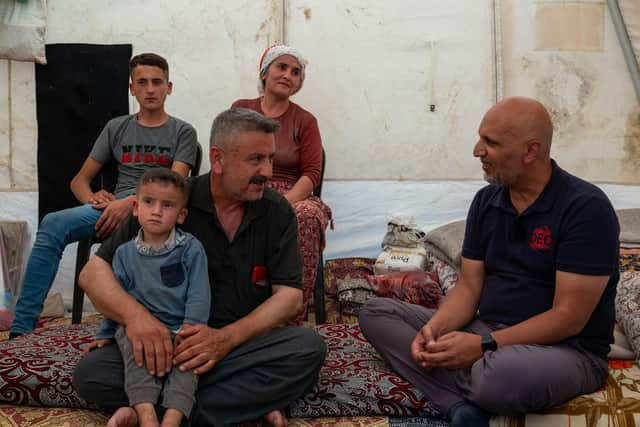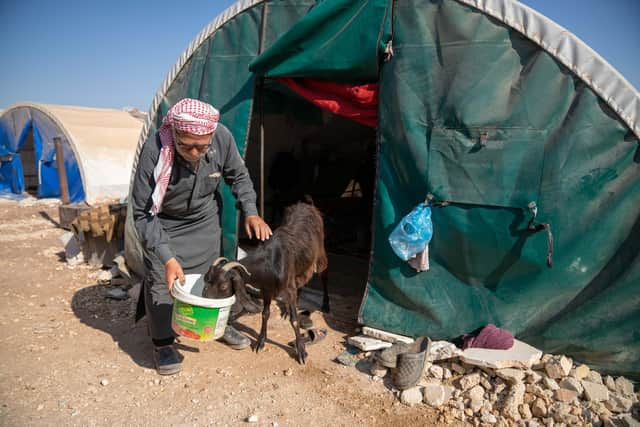Earthquake six months on: 'If I had gone home that night, would I have been among those who perished?'
On the land where their two-storey family home once stood in southern Turkey, farmers Zeynep and Mehmet and their seven children now have only a tent.
All of their belongings and crops were destroyed, their home reduced to rubble and Zeynep seriously injured in the earthquake which hit the region – and neighbouring Syria – six months ago.
Advertisement
Hide AdAdvertisement
Hide AdFew buildings remain habitable in the village where the family live, near the city of Gaziantep. Just a handful of homes that were strong enough to survive the disaster, as well as the green domed village mosque.


Zeynep, 40, recalls the morning the earthquake struck. The disaster measured 7.8 on the Richter scale and killed at least 58,000 people across southern Turkey and northwest Syria in early February. Hundreds of thousands more people lost their homes in freezing winter weather and have since had to face floods and more recently extreme heat in southern Europe as the relief effort continues.
In Gaziantep alone, which was close to the epicentre of the earthquake, more than 70 people were killed.
“On the night of the earthquake I tried to escape but a wall collapsed on me,” she says. “I was buried underneath it for hours. My husband and three of my children were also trapped.
“Eventually some neighbours managed to rescue me. It was snowing, everything was wet. They placed me somewhere I wouldn’t freeze. It was chaos.”


Her father-in-law and other neighbours managed to find a car and take her to hospital, where she stayed for a month.
“I’m a little better now. I can stand up,” she says. “Thank God all my children survived. I don’t know what I’d do if I lost them.”
Now, in 40 degree heat, Zeynep sits in a plastic chair outside the tent.
Advertisement
Hide AdAdvertisement
Hide Ad“None of our belongings survived,” she says, adding that the tent and a fridge have been provided by the Turkish government. Her children are not currently able to go to school, and with farmland covered in rubble, there is little opportunity for families to grow food or earn a living.
"I’m very thankful for the support,” says Zeynep, who received vouchers from The Disasters Emergency Committee to buy food from the supermarket. “I want my children to have food, water and clothes. I don’t want them to be hungry. If they are hungry I feel miserable. But it’s not my place to ask for more.”
DEC has raised £13 million in Scotland and £150m across the UK since it launched an emergency appeal immediately after the earthquake struck in the third largest appeal in the organisation’s 60-year history. The DEC brings together 15 leading aid charities at times of crisis overseas. Fourteen of these have worked in Turkey and Syria in the earthquake relief effort.
In Syria, which is in its 12th year of civil war, around 60 per cent of people living in the affected region have been displaced from their homes.
Mustafa, 61, is living in a temporary tent with his wife after his smallholding was destroyed by the earthquake. The couple, who have nine adult children, had already been displaced from their home in Aleppo due to the war and had built up livestock of goats and sheep in their new home region before the quake struck.
A payout from DEC of $250 has allowed him to pay for medication and essential supplies, but he warns he may have to borrow money to treat his medical conditions once the cash runs out.
"On the day of the catastrophe, we were visiting a farm near Jenderes,” he says. “Thankfully, my wife and I decided to stay there for the night at my brother’s house. Meanwhile, the earthquake struck, and our family home collapsed, and only three of my animals survived.
"I remember that day and wonder to myself: If I had gone home that night, would I have been among those who perished in the earthquake?”
Advertisement
Hide AdAdvertisement
Hide AdAfra, 60, who lost one of her six children before the earthquake, says her life changed dramatically when the disaster hit.
"Before the earthquake, life was going relatively well for me,” she says. “I lived next door to my children in an apartment building, spending my days grieving for my son, and coming to terms with the illnesses afflicting me in my old age. My husband passed away many years ago.
"Since my children moved following the earthquake, I now live by myself in my tent. For the first few months, it flooded when it rained. Recently, however, people have helped me by building strong stone walls and paving the floor with cement so that it won’t flood, even during storms.”
Saleh Saeed, chief executive of DEC, returned this week from visiting Gaziantep, where he met Zeynep and Mehmet, in an experience he described as “humbling”.
He said: “When I visited last week, it was uncomfortably hot, about 41C, but when the earthquake struck the temperatures were freezing. The whole family is living in a tent while they wait for their new home to be built and the conditions are very harsh.
“DEC charities are working tirelessly to help people cope and make life more comfortable. From mobile physiotherapy clinics helping people recover from their injuries to psychological support for children, to providing hygiene and sanitation to avoid the spread of deadly diseases - this is vital, life-changing help.”
He added: “It’s clear that it will be a very long road to recovery from this terrible disaster, but we met so many people in Turkey who wanted us to thank the British public and all who have supported them through the DEC. Thank you to everyone who has donated, we are all incredibly grateful.”
To donate to the Disasters Emergency Committee, visit dec.org.uk.
Comments
Want to join the conversation? Please or to comment on this article.
